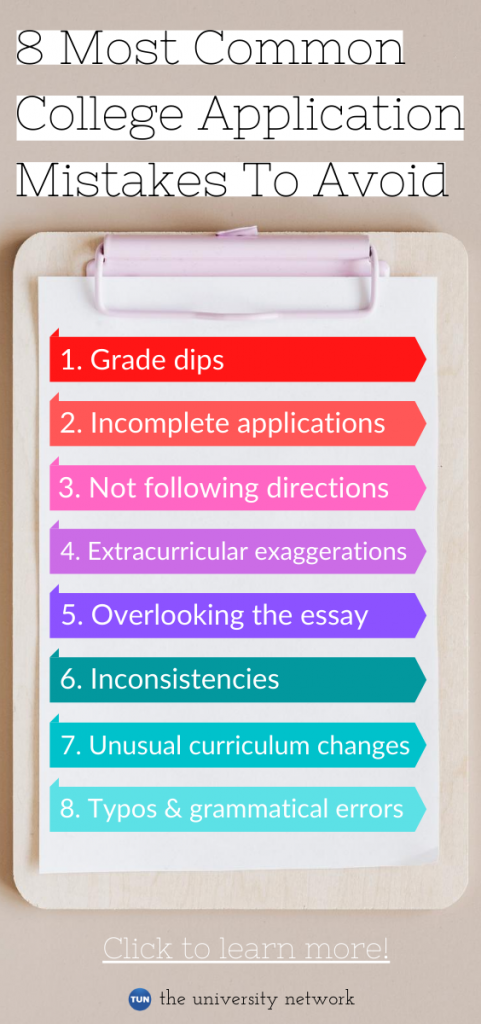You’ve made it this far. Your high school years are coming to an end, and college is right around the corner.
Before you submit your college application(s), though, there are a few “red flags” you should be aware of. Red flags are the issues and mistakes, both big and small, that may cause college admissions officers to put an asterisk next to your application or, in some cases, mark it with the big, red “declined” stamp.
Of course, the first step to fixing red flags is understanding what they are. So, we at The University Network (TUN) did some digging and reached out to a couple of college admissions experts.
Here are eight most common mistakes that you should avoid in your college application.
Grade dips
Throughout high school, you’re going to have some fluctuation in your grades — nearly every student does. While dropping from an A to a B grade average one quarter likely won’t kill your chances of being admitted to most institutions, significant dips in your grades can be a big problem.
“A weak or inconsistent academic record is really a big flag,” says Judith Burke-Berhannan, dean of admissions at Stony Brook University.
“When we see those types of things, and if we don’t have supporting documentation regarding possibly any extenuating or personal circumstances that might impact a student’s performance, then our concern is: ‘Is the student well motivated? Is the student focused? How much are they committed to their own academic success?’ ” she explains.
Hindsight is 20/20. If you’re a high school senior, any grade dips you may have had are already cemented in your transcript. Although there’s no changing the past, most college applications, including the Common App, have additional information sections that give you several hundred words worth of space to add any context you want to your application.
Use this space to explain the cause of your academic slippage.
Maybe a relative passed away during your junior year of high school and the grieving process took a toll on you. Maybe you were sick and had to miss an extended amount of school. Or, maybe your family was going through a tough time financially, and you had to pick up an after-school job that limited the amount of time you could spend on homework or studying.
“For students, being as transparent as they can be when they’ve encountered something that’s been a gridlock or hurdle for them along the way, it allows the admissions office to put a face to why those grades went a direction they went versus us just having to make an assumption that they didn’t study as hard,” says Marcus Cooper, senior program director with College Advising Corps at Texas A&M University.
Never lie on your application, though. If there’s no justified cause for your poor grades one term, admit that you made a mistake. If your grades have since risen since they dipped, you’ve clearly learned something and grown. So, take time to explain what you’ve learned and how you’ve grown on your application. Admissions officers may consider this to be a sign of determination and ambition.
“College admissions officers are always looking for reasons to admit a student rather than reasons not to offer admittance,” says Burke-Berhannan.
Incomplete applications
Applications are carefully designed so that admissions officers can gain a well-rounded understanding of each applicant. If you brush over a section, leaving it blank or with minimal information, there’s a good chance you’ll be brushed over too.
Particularly if you feel you’re on the border of being accepted, you should view the application as a way to sell yourself to the institution, Cooper explains. You want to show the institution that you’re serious and passionate about attending and that you’re doing everything you can to advocate for yourself.
When filling out the activities and/or resume section of your application, don’t sell yourself short. If you play high school football, for example, and have to routinely travel hours away for road games, don’t only give yourself credit for the two or so hours that it takes to play the game on Friday night, Cooper explains.
And when you’re describing your extracurricular activities, don’t hesitate to add a bit of detail. If you volunteer at an animal shelter, for example, don’t leave it at that. Instead, look for areas in the application to describe your impact. Try to fit in information about what you do as a volunteer, how long you’ve volunteered, and what motivates you to volunteer, for example.
Of course, in some cases, brushing over a section may not be intentional. You could just completely miss a section, forgetting to fill it out. That’s one of the reasons why it’s extremely important to go back and triple-check that you’ve filled out the application in its entirety.
Not following directions
Every year, there are applicants who opt to fill out applications their own way, rather than following the format of the application, Cooper explains.
While being unique and thinking outside the box can be a good way to stand out from a crowded pool of applicants, make sure you do so within the confines of the application directions.
When writing the essay portion, for example, try to stay around the suggested word limit. And don’t send a resume of your extracurricular activities to an institution when there is enough space to explain your extracurricular activities in the format of the application, explains Cooper.
If you must send extra, outside documents, such as additional resumes or letters of recommendation, to the college or university you are applying to, make sure you use your full name and that every document follows a similar format so that it can be sequenced to you, Cooper adds. You don’t want to lose information that is important to your candidacy.
Exaggerations about extracurriculars
Most often, students are too modest in terms of explaining the impact extracurricular activities have had on their lives. But, from time-to-time, applicants will exaggerate about their extracurriculars. Don’t be one of these applicants.
It’s always best to be honest.
College admissions officers have networks, with friends and family members in all types of professions and communities. Particularly if you’re applying to an institution in your state, you don’t want to run the risk of exaggerating the amount of hours you worked at that local nonprofit or years you played on the soccer team, for example. While tall tales may not completely disqualify you from consideration for admission, they will leave a bad taste in the mouth of the admissions officers who are reviewing your application.
Overlooking the personal statement or essay
While personal statements or essays may not carry nearly as much weight as your GPA or curriculum choices,you should never overlook the college essay, as that may flag a lack of effort and interest.
Colleges ask you to write a personal statement because they want to get a better sense of who you are, not only as a student, but also as a person. They want to know about your passions and interests, the way you think, and how you respond to challenges.
Particularly for competitive institutions, personal statements or essays provide an opportunity to set yourself apart from the crowd of equally qualified candidates. So when you look back at your application, make sure you’re comfortable with your essay and proud of the time and effort you put into it. If you aren’t, it may be best to set your application aside for the day and come back to it tomorrow with the intention of editing or, in some cases, redrafting your essay.
For tips on how to write a compelling personal statement or essay, click here.
Inconsistencies
You want your college application to be uniform and fully represent you as a person, from your academic strengths and weaknesses to the sports or clubs you’re involved with.
Most of the time, making sure your application is consistent is as simple as diligently looking back over the application. If your essay is about your experience climbing the ranks of the quiz bowl team, for example, make sure you included that you were a member of the quiz bowl team in the activities section of your application.
There are, however, additional inconsistencies that are a bit harder to address. Say, for example, that you had all As in your math classes throughout high school but only scored a 450 on the math section of your SAT.
Most of the time, situations like this don’t need any explaining, as there are all types of reasons an inconsistency like that could occur. But if you feel compelled to explain yourself, the additional information section of your application would be a good place to do so.
Unusual curriculum changes
Although policies vary, admissions departments typically want to see that applicants progressed in terms of the difficulty of their coursework throughout high school. Generally, that means if an applicant took advanced classes, such as honors or APs, early on in high school, admissions officers want to see that the applicant continued taking advanced classes until graduation.
This rule, however, should be taken with a grain of salt. Admissions departments like applicants that have challenged themselves, but they also understand that students’ schedules don’t always fall exactly how they want them to.
“Often, students have to make scheduling choices based around the constraints around what their high school is offering and what time it is being offered, making choices between taking one class versus another,” says Burke-Berhannan. “Often, there are reasons that a student might not opt to continue with an AP course or a specific track.”
So, for example, if you took three AP classes your sophomore year and, due to schedule limitations or another conflict, you only took one AP your junior year, you should find a space in the application to explain the reasons why. In the Common App, the appropriate place to explain would be in the “additional information” section.
And if you stopped taking advanced classes at some point in high school because your GPA was suffering, don’t second-guess yourself for that decision. While admissions officers like to see advanced courses on an applicant’s transcript, they don’t want to see those classes coupled with poor grades.
“We don’t want to see a student persisting with AP courses if they’re getting Cs and C-s,” says Burke-Berhannan. “If they’re consistently performing at an average or below average level, then potentially the choice of APs or the number of AP courses they’re taking needs to be considered and adjusted.”
Typos and grammatical errors
A couple of typos and grammatical errors in your college application typically aren’t that big of a deal. Admissions officers understand that fingers slip on the keyboard and that autocorrect can, at times, work against you.
But if typos and grammatical errors are persistent throughout the application, particularly in the essay section, it is not a good look. It shows admissions officers that you don’t care about the application enough to look back over it or ask a parent or friend to review it.
Conclusion
Red flags come in many shapes and sizes. They can be as insignificant as a typo or as eye-popping as an F grade on your transcript.
Having a red flag on your application is not a huge problem, as nearly everyone has a few. Leaving those red flags unaddressed, however, is how you can run into trouble.
You can help your chances of admission by checking back over your application to correct the little mistakes. And for the big red flags, make sure you take the time to provide honest and clear explanations on the application.




